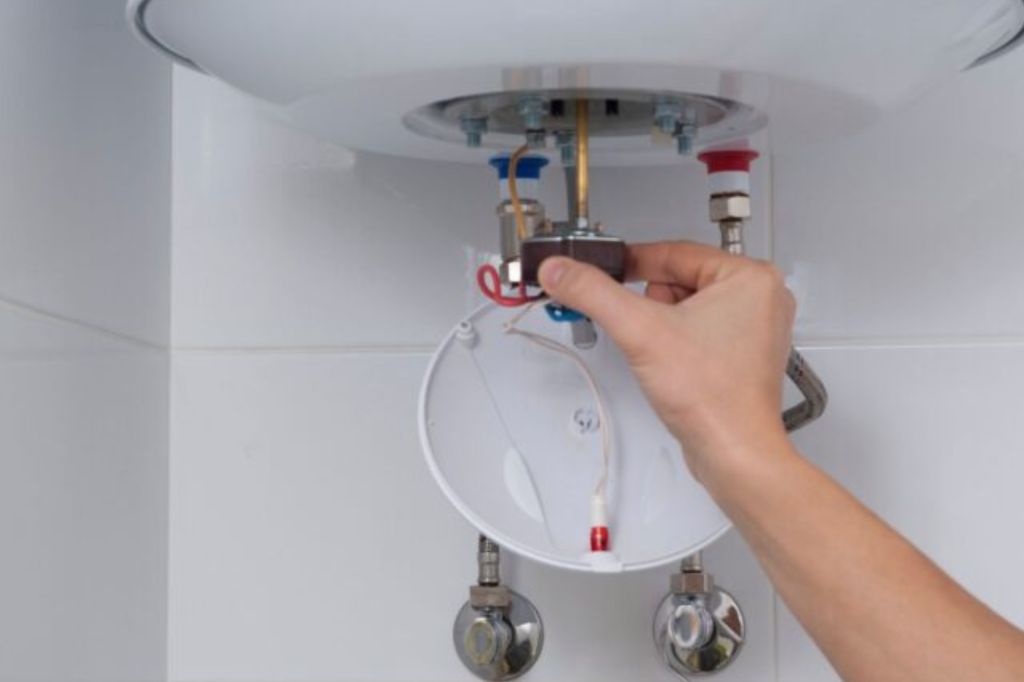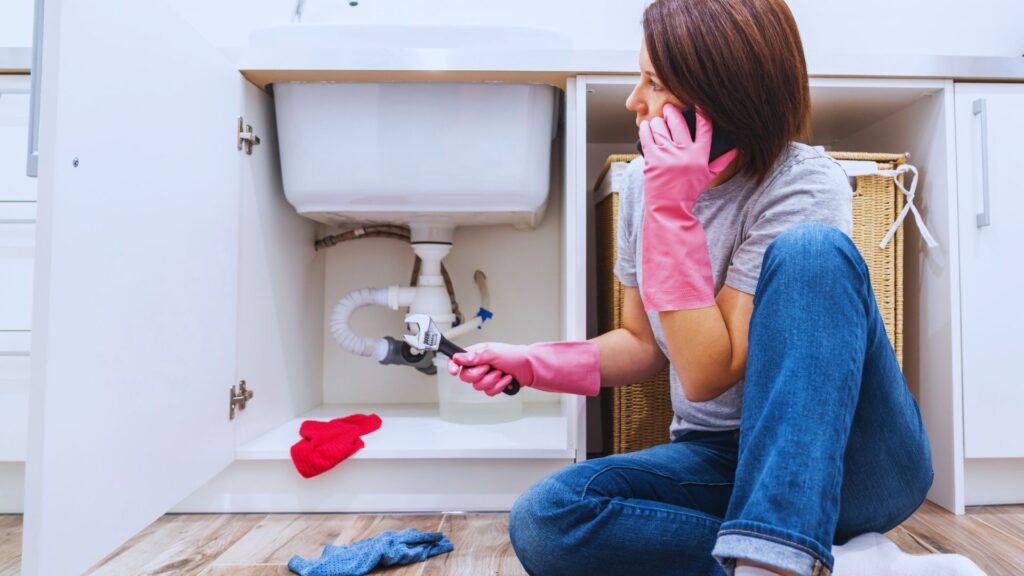You might not think about your water heater often, but understanding its lifespan is vital for maintaining comfort in your home. Typically, a water heater lasts between 8 to 12 years, and knowing when to replace it can save you from unexpected breakdowns and costly repairs. When you notice signs like inconsistent water temperature or rusty water, it’s important to act swiftly. However, there are several factors that can influence how long your unit lasts. Let’s explore what you should keep an eye on to avoid unpleasant surprises down the line.
Types of Water Heaters
When it comes to selecting a water heater, understanding the different types available is crucial. Your choice can greatly impact energy efficiency, cost, and overall satisfaction.
One popular option is tankless heaters, which provide hot water on demand. They heat water directly as it flows through the unit, eliminating the need for a storage tank. This means you won’t run out of hot water during a shower, and you’ll save space in your home.
Tankless heaters are often more energy-efficient than traditional models, as they only operate when you need hot water.
Another option to reflect on is solar heaters. These systems harness solar energy to heat water, making them an eco-friendly choice. Solar heaters typically consist of solar panels that capture sunlight and convert it into heat, which is then transferred to your water supply.
While the initial investment may be higher, the long-term savings on energy bills and the environmental benefits can be substantial.
Both tankless and solar heaters have unique advantages, catering to different needs and preferences. If you value efficiency and sustainability, these options might be worth exploring.
Understanding the distinctions between these types can help you make an informed decision that aligns with your lifestyle and values. By selecting the right water heater, you’ll guarantee comfort and enhance the overall functionality of your home.
Average Lifespan of Water Heaters
On average, water heaters can last between 8 to 12 years, though this lifespan can vary based on the type of heater and maintenance practices.
The materials used in your water heater service play a significant role in determining its longevity. For example, heaters made from stainless steel tend to resist corrosion better than those constructed from less durable materials.
Additionally, regular maintenance can greatly enhance heater performance and extend its lifespan.
Here are four key factors that influence the average lifespan of water heaters:
- Type of Heater: Tankless water heaters often last longer than traditional tank models, sometimes up to 20 years.
- Water Quality: Hard water can lead to mineral buildup, affecting the efficiency and lifespan of your heater.
- Usage Patterns: High-demand households may put more strain on water heaters, shortening their lifespan.
- Regular Maintenance: Routine flushing and inspections can prevent issues like sediment buildup and corrosion, thereby enhancing performance.
Factors Affecting Lifespan
Understanding the factors that affect the lifespan of water heaters is vital for homeowners looking to maximize their investment. Several elements can greatly impact how long your unit will last. One primary factor is water quality. High levels of minerals, such as calcium and magnesium, can lead to sediment buildup inside the tank, causing corrosion and reducing efficiency. If you live in an area with hard water, investing in a water softener might be necessary to protect your heater and extend its life.
Another important factor is your usage patterns. The more frequently your water heater is used, the more wear and tear it experiences. For instance, households with multiple bathrooms or high hot water demands may find their units working overtime, leading to faster degradation. Conversely, if you use hot water sparingly, your heater may last longer.
Additionally, regular maintenance plays a key role in determining lifespan. Flushing the tank annually to remove sediment and inspecting the anode rod can prevent corrosion and prolong your unit’s efficiency.
Finally, the type of water heater you choose can also influence longevity. Tankless systems typically last longer than traditional tank heaters, but they require specific installation and usage considerations.

Common Signs of Failure
Recognizing the common signs of water heater failure is essential for preventing costly repairs or replacements. Being aware of these indicators can help you address issues before they escalate. Here are four key signs to watch for:
- Leak Detection: If you notice water pooling around your water heater, it could indicate a leak. Regularly check the tank and surrounding areas for moisture, as leaks can lead to significant damage and increase your water bill.
- Unusual Noises: Pay attention to any strange sounds, like popping, rumbling, or banging. These noises often result from sediment buildup at the bottom of the tank, which can cause overheating and potential failure.
- Inconsistent Water Temperature: If you’re experiencing fluctuating water temperatures, it may signal a problem with the heating elements or thermostat. Consistent hot water is vital for daily tasks, and inconsistencies can be a sign of wear.
- Rusty Water: If your hot water appears rusty or discolored, this could indicate corrosion within the tank. This is a serious issue that often means the water heater is nearing the end of its lifespan.
Importance of Regular Maintenance
While it may be tempting to overlook your water heater until a problem arises, regular maintenance is essential for extending its lifespan and guaranteeing peak performance. By implementing a proactive maintenance schedule, you can avoid costly repairs and make certain your system operates efficiently.
Regular inspections and servicing allow you to catch small issues before they escalate into major problems. One of the most effective preventive measures is flushing the tank periodically. Sediment buildup can greatly affect the heater’s efficiency, leading to increased energy costs and a shorter lifespan.
You should also check the anode rod, as it plays a key role in preventing corrosion. Replacing it when necessary can save your tank from deterioration. Moreover, inspecting the pressure relief valve guarantees that your water heater operates safely. A malfunctioning valve can lead to dangerous pressure buildup, which could result in catastrophic failure.
Keeping an eye on your water heater’s temperature settings is another simple yet important aspect of maintenance. Too-high temperatures not only waste energy but also increase the risk of scalding.
Establishing a consistent maintenance schedule is key. Whether you choose to handle some tasks yourself or enlist the help of a professional, staying on top of maintenance can greatly enhance your water heater’s longevity.
Cost of Water Heater Replacement
Have you thought about how much it might cost to replace your water heater? Understanding replacement costs can help you manage your budget planning effectively.
The price of a new water heater can vary greatly based on several factors, including the type, size, and installation requirements. Here are some key elements to take into account when estimating the overall cost:
- Type of Water Heater: Traditional tank water heaters generally cost less than tankless models, but the latter may offer long-term savings on energy bills.
- Capacity: Larger units with higher capacities will naturally cost more, so evaluate your household’s water usage before choosing.
- Installation Fees: Professional installation is vital for safety and efficiency. Installation costs can vary based on the complexity of the job and your location.
- Additional Features: Features like smart technology or advanced energy efficiency ratings can increase the initial investment but may save you money in the long run.
While the average replacement costs can range from $800 to $2,500 or more, it’s important to factor in these elements to gain a clearer picture.
Energy Efficiency Considerations
When selecting a water heater, considering energy efficiency is vital, as it directly impacts your long-term operating costs. Energy-efficient models can markedly reduce your energy consumption, leading to substantial utility savings over time. These models typically have higher Energy Factor (EF) ratings, which indicate their efficiency in converting energy into hot water.
When you opt for an energy-efficient water heater, you’re not just making a sound financial decision; you’re also contributing to environmental sustainability. Many modern units utilize advanced technology, such as heat pump and tankless systems, which can provide hot water on demand without the standby losses associated with traditional tank units. This means you save money while lowering your carbon footprint.
It’s also important to evaluate the size and capacity of the unit. A correctly sized water heater guarantees that you’re not paying to heat more water than you need, maximizing both efficiency and cost-effectiveness.
Look for models with the ENERGY STAR label, as they meet strict energy efficiency guidelines set by the U.S. Environmental Protection Agency.
Incorporating energy-efficient water heaters into your home not only enhances comfort but also fosters a sense of belonging within a community that values sustainability and responsible resource management.
Choosing the Right Replacement
How do you know when it’s time to replace your water heater? If your unit’s showing signs of age or inefficiency, it’s crucial to evaluate a replacement.
Selecting the right water heater can greatly affect your energy bills and overall comfort. Here are four key factors to help you choose the best replacement:
- Type of Heater: Decide between traditional tank models or tankless options. Tankless models heat water on demand, offering energy savings and unlimited hot water.
- Energy Ratings: Look for units with high energy efficiency ratings. The Energy Factor (EF) rating indicates how efficiently a water heater converts energy into hot water. Higher ratings mean lower energy bills.
- Size and Capacity: Verify the new unit meets your household’s hot water needs. For tank models, consider the tank size; for tankless, check the flow rate.
- Fuel Source: Think about whether you want a gas or electric heater. Gas models often have lower operating costs, while electric heaters can be easier to install and maintain.
DIY vs. Professional Installation
Choosing between DIY water heater installation and hiring a professional can greatly impact the success of your water heater replacement. If you’re considering tackling this project yourself, it’s crucial to assess your skills and tools.
DIY installation can save you money and give you a sense of accomplishment, but it requires a thorough understanding of plumbing and electrical systems. Mistakes can lead to significant issues, including leaks or inadequate heating, which might end up costing you more in repairs.
On the other hand, professional installation comes with several advantages. Experienced technicians possess the knowledge and skills to navigate complex installation processes efficiently. They can evaluate your home’s specific requirements, making certain your new water heater integrates seamlessly into your existing system.
Additionally, professionals often provide warranties and guarantees on their work, offering peace of mind that DIY efforts can’t match.
Consider your comfort level with plumbing and electrical tasks when deciding. If you’ve got prior experience or feel confident in your abilities, a DIY installation might be viable.
However, if you’re unsure or this is your first time, opting for professional installation could be the safer route. Ultimately, the choice between DIY and professional installation should align with your expertise, budget, and the potential risks involved.
Making the right decision guarantees not only a successful installation but also the long-term efficiency and reliability of your water heater.
Tips for Extending Lifespan
To maximize the lifespan of your water heater, regular maintenance is key. By following these essential tips, you can greatly enhance your unit’s longevity and efficiency.
- Monitor Water Quality: Poor water quality can lead to sediment buildup, which reduces efficiency and damages components.
Regularly test your water for hardness and minerals. If necessary, consider installing a water softener.
- Flush the Tank: At least once a year, flush your water heater to remove sediment and debris.
This simple process helps maintain efficiency and prevents corrosion, ensuring your unit operates smoothly.
- Inspect and Replace Anode Rods: The anode rod protects your tank from rust.
Check it every 1-2 years and replace it if it’s greatly corroded. This proactive step can extend the life of your heater.
- Utilize Proper Insulation Techniques: Insulating your pipes and the water heater itself can reduce heat loss, improving efficiency.
Use foam pipe insulation and blankets designed for water heaters, especially in colder climates, to conserve energy and protect your unit.
Review
In conclusion, understanding your water heater’s lifespan is essential for maintaining efficiency and avoiding unexpected failures. Coincidentally, By the help of Pipe It Up, recognizing the right signs can save you from costly repairs, just as timely maintenance can extend its life. Whether you opt for a tank or tankless model, being proactive guarantees you make informed choices about replacements. By staying vigilant and considering installation options, you can optimize performance and ultimately enjoy consistent hot water for years to come.



